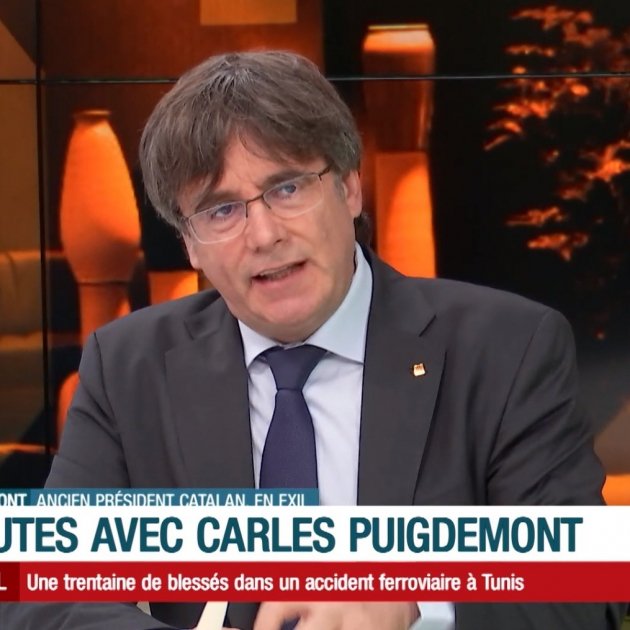Belgium's leading news channel, LN24, has dedicated a fifty-minute interview to Catalan president in exile Carles Puigdemont. Interest in Catalan independence is high among Belgians and journalist Martin Buxant reviewed the history of Catalonia to understand how the process has arrived at its current point. Among the topics raised, Puigdemont spoke about the path for Catalonia to become an independent state now: "It will be complicated, but it will be the beginning of the road. There will be no immediate recognition, but if we hold fast to our position, something we didn't do four years ago, because we prioritized another vision, and we maintain a non-violent and democratic stance, we will have options".
The programme 50 minutes avec... completed its title on Tuesday evening with the name of Carles Puigdemont, whereas the day before, the interview guest for nearly an hour had been the leader of the French left, Jean-Luc Mélenchon. Puigdemont made comparisons between Spanish justice and that of other European Union countries: "In Belgium, Germany and Italy I sensed that justice was independent, that it might make mistakes, that it might make whatever decisions it wanted to, but that there was no hatred of my ideas. In Spain I can't have an independent trial."
He emphasized that the task at hand is now "to work to ensure that our immunity is confirmed. From this point on, we'll see if Spain behaves like Poland or like the rest of Europe." That’s why he proposed the same arguments that his lawyer, Gonzalo Boye, put forward last week: “If I have immunity in 26 countries and in one I don't, where is the problem? The EU has to remedy that."
Screenshot of a moment from the interview on Belgian channel LN24
The Catalan process is of interest in Europe. The news coverage that Puigdemont received yesterday on the Belgium channel is something he has never had on the Spanish public channels, neither on La 1 or on La 2, or even on the Catalonia-only breakouts that the network offers. Buxant asked the MEP to be explicit and give viewers some background. As an example, he explained that in Catalonia there are "four capitals" - Barcelona, Lleida, Girona and Tarragona -, and in a relaxed tone he told the interviewer that "Girona is a small, beautiful capital that represents a whole model of tourism in its quality and heritage." He also praised the work of mayor Xavier Trias at the head of Barcelona city council, before current municipal leader Ada Colau took over, he and even touched on the Spanish Transition: "That arrived after the repression under Franco and the assassination of [1930s Catalan president] Lluís Companys."
He also compared Catalan autonomy with the autonomy within the Spanish state of the Basque Country, stressing that the latter "enjoys fiscal independence" and explained that the solidarity component in Catalonia "has always stood out", although adding that this should be compatible with a more equitable distribution: "All this wealth that we are able to produce with our effort, we are unable to return it to the people. There is a huge amount of money whose use we are not able to decide on: 8% of our GDP (that is, about 20 billion euros), which are lost and not recovered".
Puigdemont carries on representing Catalan independence abroad and carries on giving a message: "Spain sent 6,000 police to Catalonia with the idea of preventing the referendum. It was a movement of 2.3 million people with a network of people who put out the ballot boxes, the ballot papers and that made the referendum possible. It was unstoppable." These statements were followed closely by the journalist who kept prompting him for details. Puigdemont even spoke of the figure of José María Aznar, of his predecessor as president Artur Mas and how the rejection of a new Catalan Statute of Autonomy by part of the Spanish state fed the desire of many Catalans to claim their independence.
Main image: Screenshot from the LN 24 interview with Catalan president in exile Carles Puigdemont
